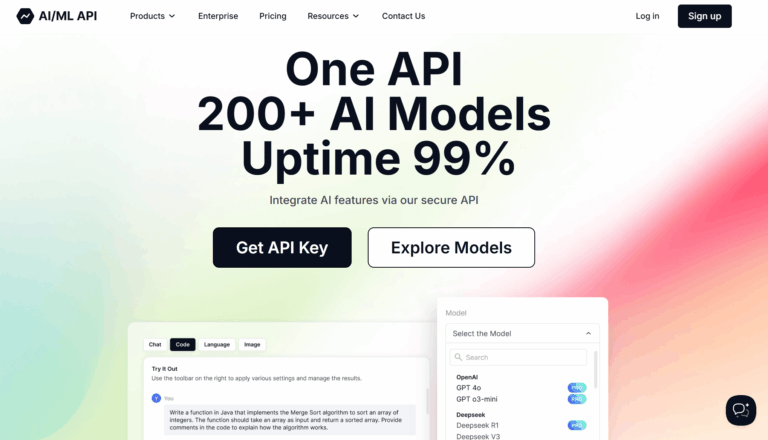What is AI/ML API?
AI/ML API simplifies integrating over 200 AI models and solves complex AI deployment for developers.
This tool tackles the challenge of accessing diverse AI models through a single API and supports tasks like natural language processing, image generation, and speech recognition. Key strengths include serverless inference, high uptime (99%), and compatibility with OpenAI’s API structure, requiring minimal code changes.
Key Features of AI/ML API
- Serverless Inference: Enables instant deployment of AI models without managing servers, reducing costs and complexity for scalable applications.
- OpenAI API Compatibility: Seamlessly integrates with OpenAI’s structure, allowing developers to switch with one line of code for efficiency.
- Extensive Model Library: Access over 200 AI models, including Mixtral, LLaMA, and Stable Diffusion, for diverse machine learning tasks.
- Advanced Tracking: Monitors API calls and token usage via a web app, ensuring transparency and control for developers.
- High Uptime (99%): Guarantees reliable performance with minimal downtime, supporting critical AI applications across industries.
- Image Generation: Produces high-quality visuals using models like Stable Diffusion, ideal for creative and marketing projects.
- Speech-to-Text (STT): Converts audio to text accurately, enhancing accessibility for voice-driven applications and transcription needs.
- Text-to-Speech (TTS): Generates natural-sounding audio from text, supporting interactive voice response systems and audiobooks.
- Low Latency: Delivers fast response times, three times quicker than competitors, optimizing real-time AI processing.
- Scalability: Supports small prototypes to large-scale enterprise applications, adapting to varying project demands effortlessly.
How to Use AI/ML API
- Sign up on aimlapi.com and obtain your API key from the dashboard.
- Replace OpenAI API key and endpoint URL with AI/ML API credentials in your code.
- Select a model from over 200 options, like Mixtral or LLaMA, based on your project.
- Make API calls to integrate AI functionalities into your application.
- Use the web app to monitor usage, track tokens, and manage access.
Key Use Cases for AI/ML API
- Chatbot Development: Build cost-effective chatbots using AI/ML API’s chat models, ensuring scalable, responsive customer support for businesses.
- Language Translation: Create multilingual applications with accurate translation systems, leveraging diverse AI models for global accessibility.
- Image Generation: Generate unique visuals for marketing or creative projects using Stable Diffusion, with predictable API tracking.
- Data Extraction: Extract insights from unstructured data like contracts or documents, streamlining analytics for enterprises.
- Speech Recognition: Develop voice-driven apps with STT, enabling transcription and accessibility for diverse user needs.
- Code Generation: Automate coding tasks with AI models, accelerating development for software engineers and startups.
Pros and Cons
Pros:
- Access to over 200 AI models simplifies development.
- Seamless OpenAI compatibility reduces integration time.
- Serverless inference cuts deployment costs.
- High uptime ensures reliable performance.
- Advanced tracking enhances usage transparency.
Cons:
- Initial learning curve.
FAQs
Is AI/ML API Free to Use?
Yes, it offers a 10 requests / hour and Free Playground ideal for testing. Pay As You go and Fixed pricing plans are available for production.
How does AI/ML API integrate with existing systems?
It’s compatible with OpenAI’s API structure, requiring minimal code changes for seamless integration into applications.
What types of AI models are available?
Over 200 models, including Mixtral, LLaMA, Stable Diffusion, for chat, image, code, and speech tasks.
Who should use AI/ML API?
Developers, startups, and enterprises building scalable AI applications for chatbots, translations, or data analytics.
Does AI/ML API support enterprise needs?
Yes, it offers dedicated servers and scalable solutions for large-scale enterprise AI applications.
How reliable is AI/ML API?
It provides 99% uptime and three times faster response times, ensuring consistent performance for critical tasks.

































